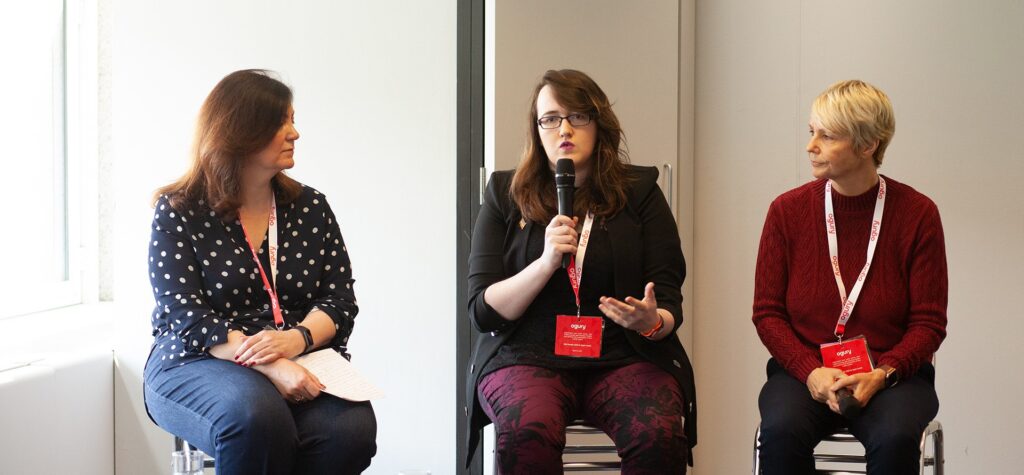
Diversity is good for gaming. It’s been shown over and over that it’s good for business because the reality is, as Xbox boss Phil Spencer has pointed out, gamers are not predominantly men. Gaming is, indeed, for everyone and yet many studios don’t keep this fact in mind, nor do they always make a diverse workforce a priority.
In a panel to kick off the 21st Century Leadership track at Casual Connect London today, leading women in games who’ve made it their mission to advocate for diversity and inclusion (D&I), shined a spotlight on the problems with building a diverse workplace.
The panel was moderated by Marie-Claire Isaaman (CEO of Women in Games) and featured participation from Liz Prince, who runs recruitment firm Amiqus and launched the “G into Gaming” initiative, Claire Sharkey (Head of Marketing and PR at developer Weather Factory), and Paula Whelan, head of Diversity and Inclusion at Right Track Learning, which trains organizations on D&I.

As Prince said right at the start, “From a recruitment perspective it’s really difficult when you keep seeing shortlist after shortlist of men, especially in development. We just need to really accelerate change. There are some amazing initiatives in the games industry already but I just couldn’t help feel that we weren’t getting anywhere fast.”
For Sharkey, part of the goal is make sure conversations are flowing and that people — all people — can feel comfortable.
“We run a thing at the end of every month called Coven Club, which is primarily for female-identifying people to come and get together and just be able to talk about things and feel comfortable and have cake and prosecco and tea and just hang out… and then sometimes I run an event called Pixelnebriation, and the idea behind that is for anybody at all — you can be any sort of human at all because diversity needs to stretch beyond one or two groups — and it’s to network but to do so in a way that [makes it more relaxed]… One of the big problems I encounter is the social aspect of the game industry and how you meet people to help your career and to make friends, etc. It can be quite daunting.”

Diversity can be interpreted in a number of ways to different people. Isaaman put forward a very interesting point. “If equality is sameness, diversity difference and inclusion openness, do these terms work in harmony or are they actually at odds with one another? What do we mean by diversity or a diverse workforce? What does it look like and what are we aiming for?” she asked.
Prince was able to quickly put the ideas of D&I into easy to understand terms.
“I wrote something down that I read that made absolute sense to me: Diversity is being asked to the party, inclusion is being asked to dance, and belonging is dancing like no one is watching,” she said. “And that really helps to think about the journey. In terms of what we’re aiming for… I hate the idea of looking at only numbers but having 50/50 [representation] in the games industry would be so amazing.”
Ultimately, the aim is to make sure that everyone on a team should have their differences respected, and their voices should all be heard. They also should be recruited in an unbiased way to begin with. Prince said that there’s a common problem of people in power “hiring in their own image,” which of course is counter to diversity.

For Sharkey, it comes down to feeling comfortable and to game companies creating environments where all employees can feel comfortable in their own skin. “A diverse environment to me is quite simple. It’s essentially one where you go out and you just feel comfortable and you don’t need to worry that who you are as a person will have some reaction or detrimental effect at all,” she stressed.
“I have had experiences feeling quite uncomfortable when men in certain environments don’t realize they can’t say something. There’s a line. People aren’t always aware that there are lines [that shouldn’t be crossed],” she continued, noting that it’s even harder when you’re the only female in the office.
Isaaman agreed with the problems many women have faced in the workplace. “I’ve had to build that resilience to move forward otherwise those experiences are too painful,” she acknowledged.
This idea of lack of comfort or being too scared to speak up was a common refrain throughout the panel. Sometimes women are too afraid to tell an executive in a position of power that they have actually crossed a line.

Whelan remarked that co-workers or superiors may not always be aware of this problem because it may not be visible.
“There can be an emphasis on what you see but people forget about the invisible differences. People often have to hide who they really are and it’s not always visible, [especially] with LGBT issues or disabilities,” she said. “Sometimes environments aren’t safe places for people to be themselves. I’ve certainly experienced it in my work and career where I’ve had to hide parts of myself because of the attitudes of others, and sometimes places that are too dangerous to expose yourself.
“Diversity & Inclusion, you can’t have one without the other. You can have a really diverse workforce but unless you take actions to include people you will inevitably exclude some people based on their differences.”
While it’s certainly a positive that more people and companies are talking about this than ever before, the time for action is now, the panel said. “I think it’s good to be talking but at a certain point if all you’re doing is talking nothing is going to happen. So you guys have actually been doing stuff and there’s other organizations that have been doing stuff as well,” Sharkey said to Prince regarding her G into Gaming initiative.
Along with all the talk, some studio heads are just saying things to look good but they don’t actually mean it. Or they don’t actually monitor the company in a way to get results.
“An awful lot of organizations will say they fully sign up to equality, diversity and inclusion but actually when it comes to actions it’s quite limited,” Whelan noted. “There are still organizations that don’t monitor their staff. If you don’t monitor how can you see where the gaps are, where the needs are?”
Prince added that recent reports on gender pay gaps have at least “spurred some into action in the games industry.” At the same time, however, she remarked that, “People don’t necessarily have to time to think about anything sometimes beyond survival of their business and getting the game shipped and making sure they’re actually staying in business.”
“So diversity efforts become speedy and maybe they recruit just people they know and so it perpetuates the same prototypes or stereotypes within their organizations. There are some good things that are starting. Sometimes there’s a massive desire to have a diverse workforce but they don’t know necessarily how to go about doing that and taking steps and that’s what I’ve focused on.”
The panel also took a minute to talk about the problems with focusing on women-only groups. Men do need to be invited into the conversation so that they can help address problems they may be guilty of perpetuating.
Sharkey referred to a talk at one company where they didn’t let the men into the discussion. Instead it would be recorded and shared with the men later. “I get it about the comfortability but at the same time, if the people that are — for the want of a better word — causing the harm aren’t exposed to what the harm is and how it makes people feel and understanding it how are things going to change? … I don’t think segregation helps,” she said.
Whelan added, “I’ve experienced it where some organizations have had women-only support groups, and it gets quite divisive because men get suspicious.There are lots of men out there that can be great allies, and it’s important to invite them to the party too.”
Prince agreed that segregation when it comes to discussion can be a bad idea, but she also is incredibly frustrated by people who ask why she or women in general push for diversity.
“The answer to anything when [people ask] ‘Why do women do this?’ is when you stop being a white privileged male come and talk to me,” she said, adding, “Women’s typical response to a man talking is to stop talking. I think men need to understand that. They have to be a part of the solution and help their colleagues to shine.”
One of the more egregious problems from the less progressive executives in the business is that they still don’t understand the value proposition of fostering a diverse workplace and making games for a diverse audience. And as Isaaman noted, these studio heads make excuses about the “kickback” their company will see if they pursue D&I.
“There are enormous benefits to diversity, of course. It’s been researched for a long, long time,” said Prince. “There are financial benefits if people are only thinking about the bottom line.”
Beyond that, hiring a diverse team actually makes for more effective development. This is where unconscious bias can come into play, because if people all get along and think similarly, they may hire the same sort of people.
“That’s actually not the most effective team when you look at the research. What you need are diverse considerations and points of view to challenge one another’s biases,” Prince stressed. “Those are the most high performing teams. There are loads and loads of benefits to D&I… but my answer is this is the right thing to do. Bottom line, I don’t care if it adds money or anything else. If you can look at half the population and say It doesn’t matter unless you give me financial return… I won’t say what I want to say since we’re being filmed.”
Prince noted that companies that don’t start actively incorporating D&I “will get left behind.” Isaaman agreed, stating that it’s actually a way for companies to future-proof themselves.
Sadly, the business case excuse persists, Whelan said, when she meets with various companies’ boards.
“It’s usually about putting a business case forward — also the moral case and the legal case. It’s a combination of all of those. Invariably the board want to see what’s in it for them. Some organizations are more progressive than others but it can be quite a challenging conversation to have,” she lamented.
Sharkey added, “My reaction would be laced with a lot more profanities. It would be great to get to the stage where we wouldn’t have to say, ‘What’s the business case, or what’s the profit in making a more diverse team?’ We’ve kind of answered the question. It’s a stupid question for someone at the top to ask. It’s frustrating as well.”
 GameDaily.biz © 2026 | All Rights Reserved.
GameDaily.biz © 2026 | All Rights Reserved.